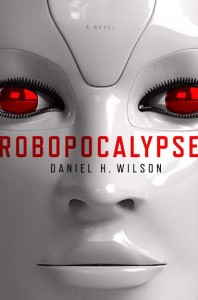 The opening chapters had a fantastic set-up: the robot uprising has been defeated (barely), here is what happened. Then, back to the beginning to find out what happened and why. Each subsequent chapter built on the suspense and urgency of the previous one, and we began to recognize main characters. The book is composed as the ‘oral history’ of the Robot Uprising—starting from the Precursor Virus, to Zero Hour, to the New War.
The opening chapters had a fantastic set-up: the robot uprising has been defeated (barely), here is what happened. Then, back to the beginning to find out what happened and why. Each subsequent chapter built on the suspense and urgency of the previous one, and we began to recognize main characters. The book is composed as the ‘oral history’ of the Robot Uprising—starting from the Precursor Virus, to Zero Hour, to the New War.
In the near future, at a moment no one will notice, all the dazzling technology that runs our world will unite and turn against us. Taking on the persona of a shy human boy, a childlike but massively powerful artificial intelligence known as Archos comes online and assumes control over the global network of machines that regulate everything from transportation to utilities, defense and communication.
In the months leading up to this, sporadic glitches are noticed by a handful of unconnected humans – a single mother disconcerted by her daughter’s menacing “smart” toys, a lonely Japanese bachelor who is victimized by his domestic robot companion, an isolated U.S. soldier who witnesses a ‘pacification unit’ go haywire – but most are unaware of the growing rebellion until it is too late.
When the Robot War ignites — at a moment known later as Zero Hour — humankind will be both decimated and, possibly, for the first time in history, united. Robopocalypse is a brilliantly conceived action-filled epic, a terrifying story with heart-stopping implications for the real technology all around us…and an entertaining and engaging thriller unlike anything else written in years.
From the publisher, Doubleday Canada (a division of Random House)
The particularly haunting thing for me was how close to our current reality the world of Robopocalypse actually is. They still have cars, live in houses and apartment with normal doors, and have wars in Middle Eastern countries, but everything in between automated; the cars have been upgraded with chips to avoid collisions, the locks are digital, there are personal care robots and attendants, humanoid robots patrol war zones. Machines have been made for every task you can imagine, yet humans aren’t obsolete in their own world (as far as they believe), they’re just incredibly dependent on artificial intelligence.
Something about Robopocalypse felt incredibly familiar, but perhaps it was just the recent influx of apocalyptic-themed stories. I really liked how the story was portrayed as snippets of the overall event. Having Cormac narrate the oral history in chronological but slightly random incidents made the reader actively piece together the story. I wanted to find out the next puzzle piece, and see how the events on one side of the world was affecting those on the other side. Most of the people didn’t know why this was happening, just that they had to survive.
I also liked how Cormac (aka BrightBoy) acknowledged that they were not the only ‘heroes’ in the uprising, and the stories he was able to tell were a mere glimpse. I find that some apocalyptic stories—most of the Action genre actually—seem to maintain the fact that without this Key Person, All Would Have Failed. Daniel H. Wilson’s honesty in this account—that one person is actually insignificant—felt a lot more real.
But, despite my enjoyment of the tale, eagerness for the next piece, and desire to reach the ending—despite all that—something fell flat for me. It felt like the ending encounter with Archos was rushed and while most of the events were foreshadowed, as the narrative moved into the present, it lost the momentum. I suppose it was fitting for the story to go out with a whimper and not a bang, but the switch in tense jarred something for me and I was left feeling unsatiated and dissatisfied.
- Listen to the creepy child-like voice of Archos on the US publisher’s site (it starts automatically and you can’t turn it off)
- Cool fact: the author, Daniel H. Wilson, has a PhD in robotics and some of the machines in the novel were inspired by real-world robotics research
- Of course there is already a movie in the works. It was supposed to come out in 2014, directed by Steven Spielberg, but it has been delayed. In fact, there is a whole site dedicated to movie news for Robopocalypse.
- Daniel H. Wilson’s author site





